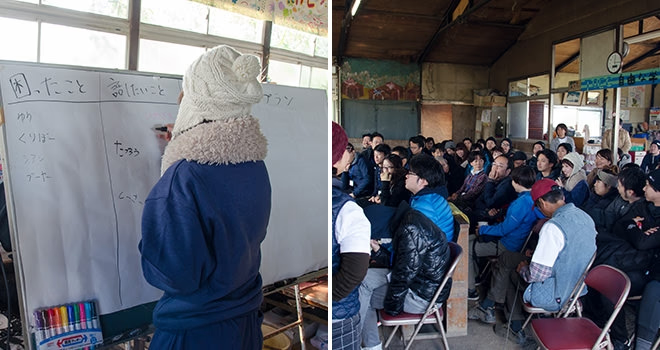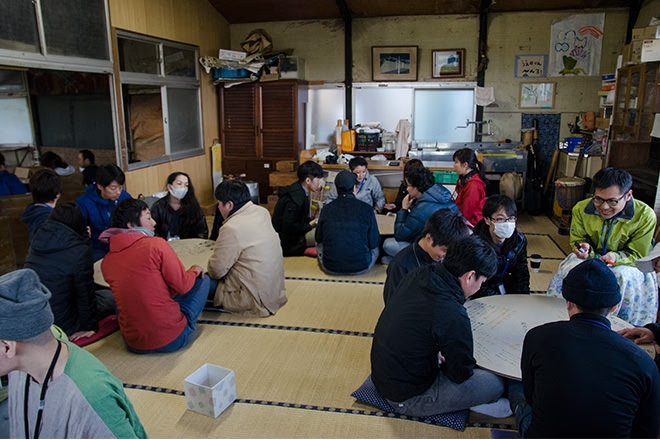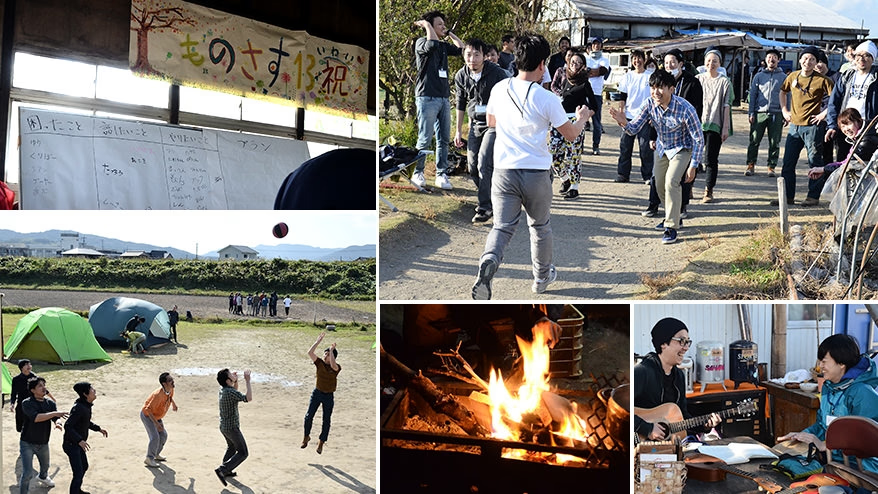For Monosus, November is a special month as we celebrate our founding anniversary.
Until now, it has been customary for us to invite guests who have helped us to our Yoyogi office and hold an anniversary party, fully embracing the DIY spirit, from planning to cooking.
However, this year, marking the 13th anniversary, the party was a little different.
Members of our company headed to Tokushima Prefecture for a three-day, two-night trip.
On the first day, we had a party at Kamaya Restaurant, a food hub project in Kamiyama Town, and from the next day we spent the day at TOEC Nature School.
TOEC (Tokushima Outdoor activity Education Center)
It was founded in 1985 as a place where children, adults, and staff could grow together among the rice paddies and fields. It operates a "free camp" where children and staff discuss what they want to do now and design a day together, as well as a free school (kindergarten, free school) with no curriculum or timetable. It supports the creation of a place where everyone can "become themselves freely."
At TOEC you can use your body to have fun, make things you like, play music, or just relax and do nothing.
It was a somewhat strange time spent here, neither for employee training nor a company trip.
( For more details, please see this article .)

On the first day, our representative, Hayashi, said, "Praising and scolding are, in a sense, a state of control, so from now on I want to make this a time where you can speak freely, without judging or being judged by others." Perhaps this was why everyone spent the time with a sense of security.
However, when it was over, I wondered what that time was all about.
It was such a memorable time that I went to Yoyogi, Kamiyama, Thailand, and Osaka. When I returned to each of these places and got busy with my daily work, a question suddenly came to mind.
So I decided to ask Representative Hayashi again what his thoughts were when he decided to go to Tokushima this time.
What is an anniversary party?
-- This trip to Tokushima was a really good experience. However, right after it ended, I started to wonder how I could bring this experience back to my everyday life. I'd like to ask you again what your thoughts were when you decided to go to Tokushima this time.
Hayashi : First of all, if we talk about the origins of the party, the founding anniversary party started with the desire to express our gratitude to all the customers and members who supported Monosus in its early days.
Ten years ago, we moved to our office in Yoyogi and changed our company name to "Monosus." After three really difficult years since our founding, we became independent from the parent company that had been taking care of us until then, so to speak, and that was our independence day.

Last year's party
So, at the beginning, it was really just me wanting to express my gratitude to everyone. I wanted to create a time where guests and all the company members could gather around the table and eat food that we had made.
However, after last year's party ended, I no longer felt like there was any room for growth in Yoyogi.
- Are you saying that Yoyogi isn't likely to develop any further?
At first , I and other members who were good at cooking hosted about 50 guests and about 15 members, totaling about 70 to 80 people, so it was something with a certain touch. I don't want to do the same thing over and over again, so I brush it up and evolve it every year, so much so that you could say it escalates (laughs).
At the same time, the company's space, members, and guests increased, and from one point on, members were asked to help plan the events, and the event began to take on the feel of a formal company event rather than a personal form of "hospitality."
Every year, after the party is over I start thinking about the following year, but after last year's party was over I had the feeling that maybe it was time to change things up a bit, that we might not be able to do it the same way again.
- Do you feel like you might not be able to do it in the same way again?
I had members of Hayashi Food Hub come and cook for me, and I had chefs I know come and cook for me... I felt like I had exhausted everything I could do in this place. And the company situation has changed.
- So things have changed?
HayashiFor the past five years or so, I've basically left it up to the members who planned the party, but since it's a party with important guests and a big event with over 200 people, I can't let it go wrong, so I often get involved in directing. But I've started to think that it's not right to get involved in that way.
Also, when we have a party, there are many members who enjoy themselves, but there are also some who want to distance themselves from such lively places. In the past, I thought that someday those members would come here, and I couldn't accept that they wanted to distance themselves. But this year, I couldn't let those feelings go. I started to want to make the party a happy one for those members as well.
With the idea of not being able to see what came next after the anniversary party at the Yoyogi office, I wanted to establish a different axis and take things in a new direction, which I guess you could call a developmental sublimation of change. I think that's what led to my trip to Tokushima.
But the simplest answer is intuition. A strong intuition, of course.
The deepening of the ruler and freedom
-- You had not been able to tolerate the members' stance of wanting to distance themselves from busy places, but this year you felt like you "could no longer just leave them alone" - why do you think that was?
HayashiThis year, 2017, was, in my own words, a year of rapid change within the company that could be described as a "measurement shift" over the past few years.
The biggest thing is the introduction of full flextime. Basically, you decide the days and hours you work. In other words, by removing one of the restrictions on working hours, everyone is starting to use the "freedom" of time. I wonder if that is also related.
A company's systems are first based on "values" and then designed around those values, and it was this year that those "values" were clearly incorporated into the company's system.
-- What exactly do you mean by values?
Hayashi: What I've been trying to convey in various forms through the consulting work I've done so far and the monthly " Open Marketing " article I write has been something I've had a vague feeling about since before I started Monosus, but in one word, it's that I "want to make business free."
People tend to think that a business can be run by neglecting oneself, but that's not the case. I think people naturally gather in a business that gives a sense of freedom. And if you yourself are not free, it won't be a "free business." That's why it's so important that our members are truly "free."
The full flex system was established as one of those "freedoms," and that's how it began.
And I feel like by using that freedom, changes are happening within the company.
- What kind of changes are there?
HayashiFor example, morning assemblies. The "Thank You of the Month" section (where the person on morning assembly picks one person they're grateful to that month and explains why) was a great time when we first started morning assemblies, even to the point of sometimes getting emotional, but as morning assemblies became more of a formality, fewer people started participating due to the full-time schedule.
-- It's true that the number of participants has decreased compared to before. The members may also be becoming more fixed.
HayashiThen , the executives were considering whether to continue the morning meeting. However, we didn't want to just end it, and wanted to make it something new that would be the next step. At that time, we thought that maybe there might be some hint in Toek's morning meeting. So, for the time being, we decided to have at least the executives participate.
*Morning Meeting A morning meeting held by children and staff at TOEC's kindergarten and free school. Everyone gathers together to discuss three topics: "What is bothering you physically, mentally, and emotionally?", "What you want to tell everyone?", and "What you want to do today?", and to design a plan for the day. It is an important time to listen carefully to your own feelings and those of others, and share them.

A morning meeting held by Monosus members. It was impressive to see how as soon as a member started to talk about a problem they were having, other members came forward to offer their support, and the problem was quickly solved.
--How did you originally connect with Toek?
The person who introduced me to Hayashi was Yoshiaki Nishimura , and I still haven't asked him why (laughs). I guess he somehow found something in common between Monosus and Toek. I've been meeting him almost every month for about a year and a half, and we've gradually deepened our relationship, and we have a lot in common. Above all, Toek was a place where you could experience "freedom." When we went there with just the executives in October, a Toek staff member said, "We want to go eat Kamaya bread together." So I asked him, "Can I bring Monosus staff here?" and the other Toek staff members said, "We want to have a free camp for 70 adults!" and we were like, "Yay!" It was a bit of a whim (laughs).
But more than that, the main reason was that I wanted people to experience "freedom" here, not just understand it with their heads. For example, when you eat something that is properly made and really delicious, you feel satisfied and your body feels lighter after you finish eating it. In the same way, if there is something that you can't convey no matter how much you explain it verbally, I wanted people to experience it for themselves, which was a big reason why we all went together. I think we wanted to share "freedom" through our physical senses.
Sharing "freedom" through physical sensations

-- I think that the feeling of being able to spend time freely and talk freely remains something, even if each person feels differently. But do you have any plans to continue doing something like that within the company in the future?
Hayashi: I'm not really thinking about it at the moment...
However, just as the experiences of seeing something together and doing something together are very important to people, I believe that the sense of "freedom" that we shared will definitely come in handy in the future.
-- I see. Now that it's over, do you feel like you all shared a sense of freedom?
HayashiFor example, during the working group for improving full flextime, which began last month, everyone was saying what they wanted to say, probably because they shared the common understanding that they wouldn't be judged. Even as they were saying things, they seemed to be trying to avoid infringing on the freedom of others, and it was a really enjoyable time.
Even though it wasn't immediate, I think the reason we were able to have a conversation based on a sense of "freedom" like this was because we were able to share it through our physical senses.
TOEC's theme is "Becoming yourself freely", which means becoming yourself. I think that's very important for the company in the future. Although childhood is a very important time to develop "your free self", you basically can't choose for yourself.
I think it's tough to remain like that even as an adult because you weren't able to cultivate your own "freedom" as a child. I think it's necessary to have an environment that brings you closer to "freedom" even after you enter society, and I hope that Monosus can play one of those roles for its members. I also hope that I can help the companies involved become "free" as well.
Even after entering society, you continue to get closer to "freedom."
And I hope that Monosus can be one place that can fulfill such a role...
It was a fresh idea for me.
And during my time in Tokushima, I had thought that I might aim for change within the company by adopting something more easily understandable (for example, directly adopting TOEC's methods at Monosus), but the most important thing was that I visited TOEC and "shared the bodily sensation of freedom."
The physical sensations that the members brought back from their trip to Tokushima could be considered the seeds of "freedom". How will they grow in the future? I myself am looking forward to it. I would also like to share with you how the "seeds of freedom" grow.

